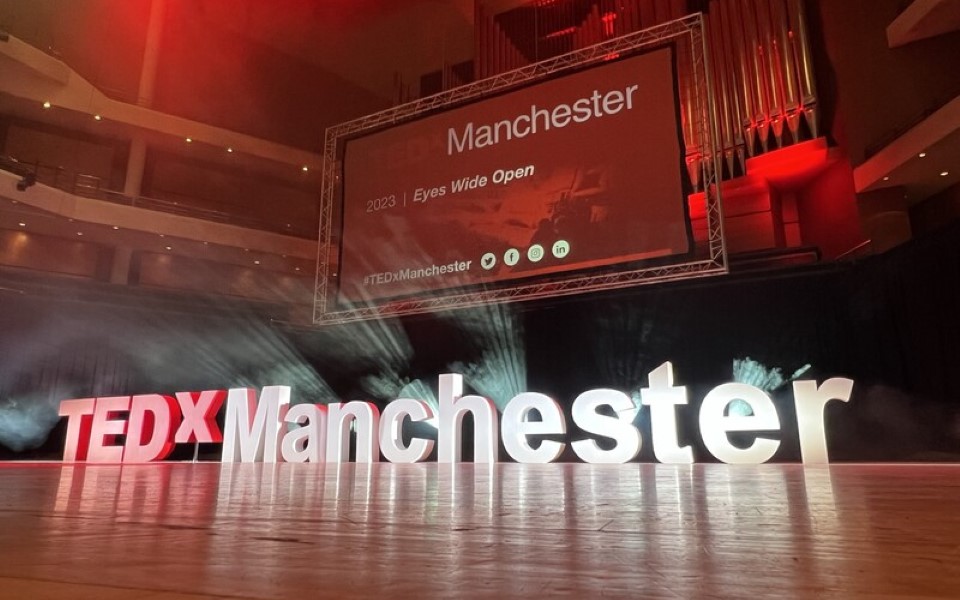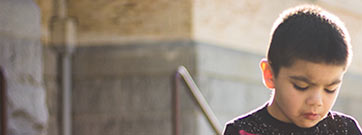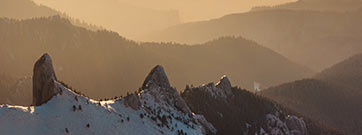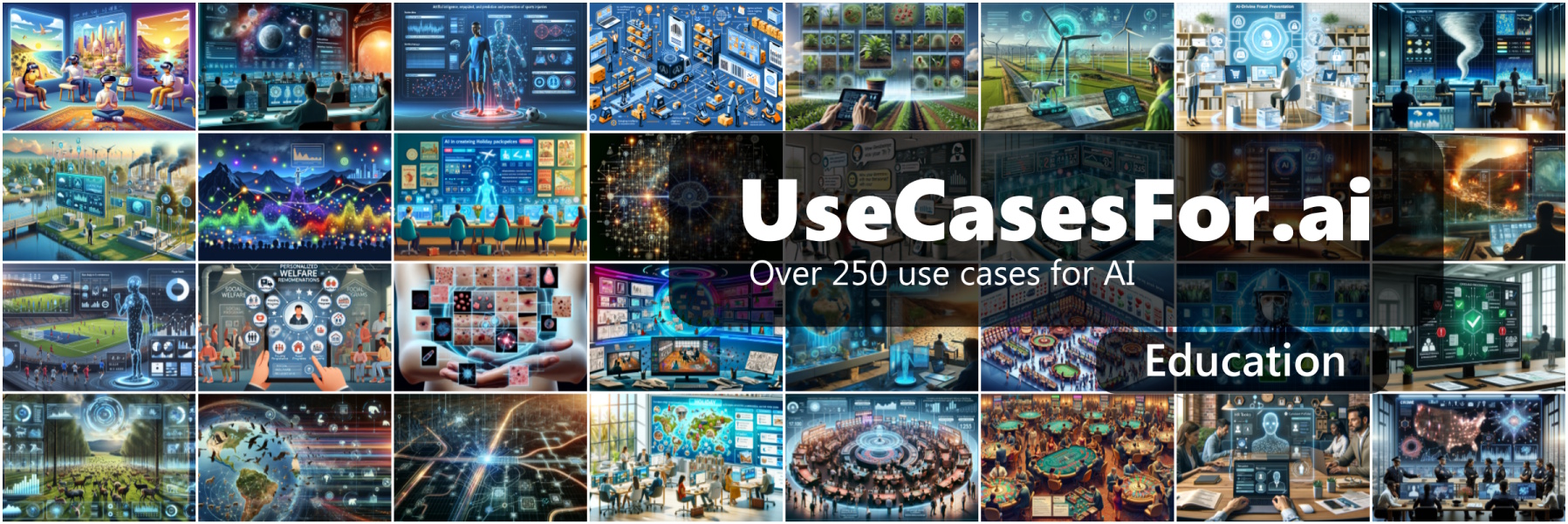Notes from TEDxManchester 2023
After enjoying TEDxManchester 2022 so much (see last years write up), it was a no-brainer to prioritise attending the event again this year in the fantastic venue that is Bridgewater Hall.
If you are unfamiliar with TED talks, their purpose is the sharing of ideas.
Herb reflected that this was the 14th TEDxManchester and briefly mentioned mentioned Carol Dweck's Growth Mindset.
This years theme was "Eyes Wide Open" - which if you look closely is a common thread that weaved between and connected many of the talks on the day..
(In Lieu of official talk titles i've taken some liberty in titling the talks below).
Bioelectricity in the Body by Sally Adee

Previously an editor at New Scientist, now Freelance science and tech writer discussed bioelectricity in the human body. Starting with its first discovery in the nervous system, nerves and muscles in the 18th Century (and discounted as "real" electricity by people at the time).
It turns out that most of the cells in our bodies have varying electrical charges and have holes in them known as "ion channels". Apparently when cells become cancerous they can lose their charge, suggesting that bioelectricity must be critical to healthy living organisms and bioelectricity plays a big part in cellular repair.
Apparently if a child loses a finger tip before age 11, it can grow back but after age 11, this ability stops??
She went on to discuss modern tools for measuring bioelectricity.
She described the phenomenon of Galvanotaxis, whereby biological cells in a petri dish will move towards the cathode when exposed to a charge and these cells move when exposed to a magnetic field. This has led to scientists being able to influence the development of cells and organisms using solely electricity including being able to grow a worm with two heads.
Perhaps not as useful as other experiments that that have resulted in reverting cancerous cells using solely electricity. Even various defence departments are experimenting with using electricity to help speed up wound repair.
Ending a great opening talk, by remarking that bioelectricity is still being understood today, may help form a biology equivalent of the standard model used by physicists and that the acceleration is in this area is increasing.
The Fidget Factor by James Levine
[Sorry James I forget to take a photo of you!]
A very animated and smiley James Levine gave the second talk of the day by sharing research results into weight gain, obesity and activity stating alarming figures such as half of the world on target to be overweight by 2035 with 60% of office workers eating at their desks.
He remarked that these days it is more than possible to consume 5,000 calories and with driving to work can result in walking less than 100m.
He shared the results of experiments where subjects were purposely overfed, with some not gaining wait at all.
Delving into this, they found that people have an innate biological desire to move and that different people are better or worse by varying degrees at ignoring this natural impulse to move. Those better at ignoring it, have made their brains less sensitive to Orexin, effectively a neuropeptide that encourages (among other things) movement and as a result move less and gain more weight.
He recommended that the best way to avoid weight gain is to not ignore this innate impulse to move and to embrace it with walks and walking meetings. Sharing that those that start being slightly more active this way, then sometimes go on to pursue more physical activities for exercise, with Herb Kim later referring to it as movement being a "gateway drug" to exercise and a healthier lifestyle.
He shared that children learn better when they can incorporate movement into their learning.
I think what I liked most about James's talk was the simplicity of his message..
"Get up & move".
And in closing, he and Kim had us all (ironically sat down), stand up (those that were able).
CIA Agent Turned CEO by Rupal Patel

Rupal shared some exciting / dangerous example of her activities while in the CIA then went back to describe her difficult childhood due to her feeling isolated, different from the others, prone to anxiety. Her mum's advice "Just be yourself" seemed to not be working in those formative years.
Later on she was valued by the CIA for the very reasons she previously felt uncomfortable. Her shy, nerdy, introvert geekiness gave her great empathy and pragmatism that showed in her work. She found others like her at the CIA that found strengths from their differences and together they did great things as they brought fresh perspectives to solving problems.
It seemed that the CIA had realised the value of individuals, those that didn't follow standard operating procedures and had began to value competence over seniority.
Rupal shared the "power of not fitting in" and how you should "never stop feeling awkward".
At the end, she recommended trying to work with different kinds of people you normally wouldn't and reflected, that ultimately her mums advice of "Just be yourself" was good advice after all.
Herb Kim remarked "It sounds like working for Google with guns"
Analysing Desire by Charlotte Fox Weber

Charlotte compared desire to the children's game of hide and seek containing both the thrill of hiding with the want of being searched for and found - that someone will come and find us.
Too often do we hold back (or deny) our desires to our detriment. Having talked with people at the end of their lives, their greatest disappointment was that they did not fulfil their desires or deal with past issues before it was too late.
Charlotte descried our reluctance to share our desires.. "If we show our desire, we fear it may make us undesirable", she also stated that it was ok to admit our desires (it doesn't mean we have to act on them) - be honest with yourself with what you do and do not desire and admit that we lie all the time.
Sometimes we live our lives the way they "should" be lived, not the way we want to live them.
Charlotte also mentioned that sometimes we obsess over the minutiae of life rather than deal with the larger issues.
Smelling Parkinson's by Joy Milne

Joy, her mother and grandmother all have hyperosmia - a heightened sense of smell. Encouraged by her mother - "not to tell anyone" they often had fun smelling different things.
After becoming a nurse in the NHS, Joy developed an olfactory library/palette that could smell a number of difference diseases.
This became personally significant to her when her husband's smell changed between the age of 31 and 33. 12 years later, he was diagnosed with Parkinson's.
Upon attending a Parkinson's support group, Joy was overwhelmed by her ability to smell who did/did not have Parkinson's in the room.
After being dismissed for suggesting using smell to diagnose Parkinson's by medical professionals, it was at this point that she began working with researchers to prove the science and accuracy behind her ability.
Not only did so pass scientific rigour, the "incorrect" false positive she diagnosed by smell from the control group, later went on to be diagnosed with Parkinson's.
This inspiring individual launched "Nose to Diagnose" and help researchers develop tests for diagnosing Parkinson's and also contributes to Parkinson's Research worldwide.
She continues to use her remarkable ability to help develop tests for other diseases such as Tuberculosis (over 5,000 people a day die from TB, 1 in 5 are children).
For me, one of the most thought provoking takeaways was the ethics she has in place around her ability - admitting that whilst she can smell disease on people in supermarket queues for example, she refrains from mentioning it them on ethical grounds.
Imagine being faced with that moral dilemma.
Sharks Aren't Bad by Hannah Rudd

Hannah shared how since Jaws was released in 1975, people have increasingly vilified sharks without the real-world figures/experience in reality to back up the bloodthirsty, human hunting image Hollywood portrayed all those years ago.
"The Jaws Effect" - Fear sells. Even Steven Spielberg has expressed remorse over the negative image sharks have endured since the release of his movie.
Displaying a clearly visible, palpable love of Sharks, with over 500+ species, 40 of which can be found around the UK waters, Hannah shared how Sharks are an important part of the ocean ecosystem.
Even though sharks have been around for 400 million years and survived 5 mass extinctions, they are endangered now because of humans. It is sharks that should fear humans, not the humans that should fear sharks.
There is still a lot of mystery around Sharks, with humans still never having seen Great White Sharks reproduce.
We should re-assess our stereotypes of these creatures ("Eyes Wide Open"), and believes Sharks could undergo a re-brand just as Whales did after they were previously similarly feared and hated by early sailors.
Courage (to Be/Act Different) by Damian Hughes

Damian suggested that courage needn't be a huge heroic action, instead it can be having the guts to be and act different. Something that doesn't come naturally to us, because as a species as we are ingrained with a desire to be approved and accepted by the people around us/our pack by fitting in. So being different feels psychologically risky to us.
Sociophobia is high on the lists of peoples fears - the fear of embarrassment in social situations.
"Dead fish go with the flow" - Roy Keane. A fantastic quote.
All too often we desire to fit in. Damian encouraged us all to "dare to be different" (Eye's Wide Open).
Damian shared the story of Cliff Young - A potato farmer who became an Ultra Marathon runner who ran his first race in 1983, not following convention wearing boots and shuffling, attracting ridicule in the process though going on to not only win the race, set a new record but change the accepted norms of ultra marathon running in subsequent future races.
Cliff dared to be different and was not held back by sticking to the status quo.
Other gems shared by Damian include:
- Kanter's law - Everything looks like a failure in the middle
- Xander letter - Writing a letter, placing yourself in the future, looking back
- Paradoxical commandments by Dr Keith - Held in high regard by Mother Teresa
- The power of small wins to improve incrementally
Have the courage to be true to yourself
How Manchester Got High on Music by Andy Spinoza

I'm not a huge music fan, so this talk didn't resonate with me that much however, I could understand why Andy was drawing connections between the music scene in Manchester and its inner city revival.
He remarked that in the 70's as the government let various industries in the area go bankrupt, looking around back then it appeared as though "life had used Manchester up and thrown it away".
The Hacienda (nor ironically flats) was a cultural and community experiment as much as a music venue. He claimed music was a catalyst for economic regeneration.
Manchester slowly became "the original modern city", and very investible, with investment coming from both local entrepreneurs and international ventures from the far east.
He put some of the turnarounds success down to local council leadership understanding the importance of the music culture, and "getting out of the way" and letting the community get on with it.
On closing Herb asked ".. any fear that the creativity will be squeezed out?" to which Andy answered with a resounding "Yes" followed by "We live life forward but remember history backward".
Bakineering & Curiosity by Andrew Smyth

Andrew, like many of us felt that societal norms and the education system sets out a pre-determined, templated path for us.. primary school, secondary school, college, university (Engineering degree), get a job.. but then what?
His curious nature always left him asking more questions at school and certainly afterwards.
He found himself for the first time being able to do what he wanted, not what he was told to do. Which begged the question.. what do I want to do now?
He began pilot training, but found aerospace more appealing, wanting to design airplanes more than fly them. Around the same time he found a love for baking evident from his time as a contestant on the TV show The Great British Bake Off.
Whilst he had a love for baking, he thought it a bit "frivolous" so wondered how he could combine his love for baking with his love for engineering.. giving rise to his new passion of "bakineering".
His bakineering would lead him to be a judge on Netflix's "Baking Impossible" and create a jet engine themed king for Prince William.
He shared some of the ways that ingredients are used in new ways - for example Xanthan gum (which I think you find in chewing gum?) which is used as a thickener and stabilizer is used to help set concrete underwater.
He shared that by following your passions and curiosity you can, "have your cake AND eat it".
He also shared his belief that society's desire to make people increasingly expert in subjects become specialists needs to be re-visited. He believes (and I share this belief) is that the world needs more generalists, people that are able to apply multiple disciplines to solve problems as they can bring wider perspectives and more innovative solutions.
Mysterious / Missing Particles by Alex Keshavarzi

Admitting that the subject of The Universe, is a little awe-inspiring and Alex spoke about the 17 known particles that make up the known Universe aka "The Standard Particle Model of Physics". He shared that the rate of the universe's expansion is increasing and physicists DON'T KNOW WHY.
Where is all the anti-matter? He asked?
He believes the secret to discovering the missing particles/mass/energy that would explain what physicists observe, lies in how fast Muon's wobble in a magnetic field. Because they do not behave as expected, they believe they are experiencing the interference of a yet-to-be discovered particle.
Current experiments are showing that there is another particle but there is a 1 in 40,000 scope for error which needs to be reduced to 1 in 3.5 million in order to be generally expected. He is confident they will get there.
Dupli-Tecture & Biomimicry by Anthony Ogbuokiri

Anthony started by asking "Why would you wear ski wear in the desert?"
You wouldn't - people know to dress appropriately for the climate they are in.
He shared that the same unfortunately cannot currently be said with buildings and architecture and showed a number of examples of buildings that wouldn't look out of place in the London Skyline in the centre of Lagos, Nigeria where it is at least 20 degrees centigrade warmer.
Narcissism, hubris and naivety are resulting in inappropriate buildings being built in climates for which they were not designed creating "human ovens" that require significant energy to cool because of their design flaws not accommodating the local environment.
Anthony's argument that we should build (and dress) appropriately for relevant climates and not try and not assume that architecture in a cold climate will be appropriate for a warm climate.
He then goes on to talk about biomimicry and asks What would nature do?
Nature is fantastic at adapting to the local environment, so it stands to reason that we should be taking inspiration from nature. He gave examples of recent & proposed architecture in hot climates that mimic ant hills which sport ventilation tunnels and multi level floors that mimic the multi levelled rain forest canopy.
Anthony's points are fantastic and well made. I hope to see an increased focus and uptake on climate appropriate architecture in the future as constructing with the climate in mind can considerably reduce energy usage & costs.
Suicide Prevention and Postvention by Angela Samata

In the penultimate talk, Angela shared her sad story of how her husband ended his own life aged 32 and shared some of her wonderful memories of him.
Her main call to action was to increase the amount of postvention support available to bereaved family and friends as they, whether they know it or not are by association, in a high risk category themselves.
With alarming figures of suicide in males, only yesterday was I made aware of a friend of a friend who took their own life. Having watched Angela's talk, I made sure to recommend my friend seek some support from SOBS something I wouldn't know to do have done before watching Angela's TED talk.
On peoples predilection to avoid difficult situations and conversations Angela asked "don't cross the road away from me, cross the road to me". Don't stay away.
Challenging Our World Models by Reviewing How the Brain Works by Frans Scott

After a little more setup time than Herb was expecting, putting his filler skills to the test.. Frans showed an optical illusion created by a camera and spinning piece of paper in a dark box that resembled a 3D window.
Remarking that our brain stores stereotypes as a way of recording mental models of its understanding of the world to increase the speed of recall..
When asking the audience to think of a pilot.. she asked if most of the audience thought of a white male pilot.
Whilst our stereotypes are built up from our experiences (or what we're told to believe - thank you TV!), it is important to challenge those stereotypes and try to change our mental models where we can to reflect the real world.
We should challenge our mental models (Eyes Wide Open).
Her talk made me think of a couple of things.
Penrose stairs - where our brain struggles to deal with an impossible illustration that couldn't exist in reality and Pareidolia - the brain's habit of recognising faces in every day objects.
Summary
I enjoyed all the talks this year and speaking to a few of the other audience, they did too, I can't wait for next year.
Until such time, make sure you go forth "Eyes Wide Open".
-- Lee
















